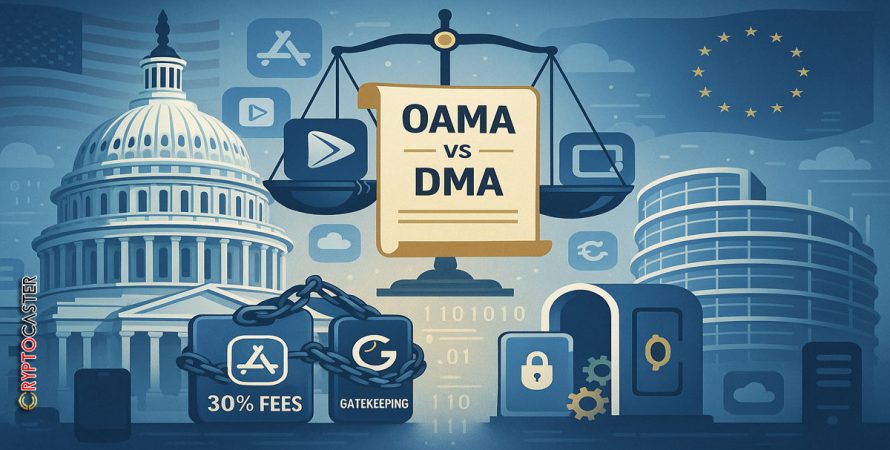In June 2025, the U.S. Senate reintroduced the Open App Markets Act (OAMA), a bipartisan initiative aimed at curbing the monopolistic practices of tech giants like Apple and Google in the mobile app ecosystem. This legislation seeks to promote competition, enhance consumer choice, and reduce costs by implementing measures that prevent app store operators from engaging in anti-competitive behaviors.
Stay in the know on crypto by frequently visiting Crypto News Today
Objectives of the Open App Markets Act
The OAMA outlines several key provisions to achieve its goals:
- Alternative Payment Systems: Prohibiting app store operators from mandating the use of their in-app payment systems, thereby allowing developers to offer alternative payment options.
- Sideloading and App Store Choice: Allowing users to install apps from third-party sources (sideloading) and enabling them to choose default app stores, promoting a more open ecosystem.
- Anti-Steering Provisions: Preventing app store operators from restricting developers from directing users to alternative purchasing options outside the app store.
- Prevention of Self-Preferencing: Banning app store operators from favoring their own apps or services in search results or recommendations.
These measures aim to dismantle the walled gardens established by dominant app store operators, fostering a more competitive and consumer-friendly environment.
CryptoCaster Quick Check:
The European Union’s Digital Markets Act: A Precedent
The European Union’s Digital Markets Act (DMA), adopted in 2022, serves as a significant regulatory framework targeting large digital platforms, referred to as “gatekeepers.” The DMA’s primary objectives include ensuring fair competition, enhancing user choice, and promoting innovation within the digital market.
Key provisions of the DMA include:
- Gatekeeper Designation: Identifying platforms with significant market influence and imposing specific obligations to prevent anti-competitive practices.
- Interoperability and Data Portability: Requiring gatekeepers to allow users to transfer their data to other platforms, facilitating competition and user choice.
- Transparency and Accountability: Mandating clear communication regarding platform algorithms and decision-making processes to ensure accountability.
The DMA’s comprehensive approach has led to significant changes in the European digital landscape, compelling major tech companies to adjust their business practices to comply with the new regulations.
Comparative Analysis: OAMA vs. DMA
| Aspect | Open App Markets Act (OAMA) | Digital Markets Act (DMA) |
|---|---|---|
| Scope | Focused on mobile app ecosystems in the U.S. | Broad application across various digital sectors in the EU |
| Targeted Entities | App store operators like Apple and Google | Large digital platforms (“gatekeepers”) across multiple sectors |
| Key Provisions | Alternative payment systems, sideloading, anti-steering, self-preferencing bans | Gatekeeper designation, interoperability, transparency |
| Enforcement | Federal Trade Commission and Department of Justice | European Commission and national authorities |
| Implementation Timeline | Pending legislative approval | Phased implementation with ongoing enforcement |
While both the OAMA and DMA aim to foster competition and protect consumers, the OAMA’s focus is narrower, concentrating on mobile app ecosystems within the United States. In contrast, the DMA adopts a broader approach, addressing various digital sectors across the European Union.
Implications for Stakeholders
- Developers: Both legislations empower developers by providing more control over their apps and revenue streams. The OAMA’s provisions on alternative payment systems and sideloading align with the DMA’s emphasis on interoperability and data portability, offering developers greater flexibility and opportunities for innovation.
- Consumers: Users stand to benefit from increased choices and potentially lower costs. The OAMA’s anti-steering and self-preferencing provisions, coupled with the DMA’s transparency requirements, ensure that consumers have access to a diverse range of services and information.
- Tech Companies: Major platforms like Apple and Google face increased scrutiny and regulatory obligations. Compliance with these regulations may require significant adjustments to their business models and operational practices.
Conclusion
The reintroduction of the Open App Markets Act marks a critical step toward enhancing competition and consumer choice in the U.S. digital landscape. By drawing parallels with the European Union’s Digital Markets Act, it becomes evident that regulatory measures can effectively address monopolistic practices and promote a more open and equitable digital environment. As both legislations continue to evolve, their impact on the global digital economy will be closely observed, setting precedents for future regulatory efforts worldwide.
If this article brought you clarity, insight, or value—support the work that made it possible.
At CryptoCaster, we report on Web3, crypto markets, and institutional finance with no billionaire owners, no shareholders, and no hidden agenda. While mainstream media bends toward Elon Musk, BlackRock, and JPMorgan narratives, we stay focused on what matters: truth, transparency, and the public interest.
We don’t just cover the headlines—we investigate the power structures behind them. From FTX and Ripple to the quiet push for CBDCs, we bring fearless reporting that isn’t filtered by corporate interests.
CryptoCaster is 100% paywall-free. Always has been. To keep it that way, we depend on readers like you.
If you believe independent crypto journalism matters, please contribute—starting at just $1 in Bitcoin or Ether. Wallet addresses are below.
Your support keeps us free, bold, and accountable to no one but you.
Thank you,
Kristin Steinbeck
Editor, CryptoCaster
Support CryptoCaster: The Unfolding of Money
At CryptoCaster.world, we’re dedicated to bold journalism, sharp insights, and fearless commentary across blockchain, Web3, and crypto markets. Your **Bitcoin contributions** help us stay independent and continue delivering signal over noise.
🚨 CryptoCaster does not offer investment advice. Always DYOR—volatility is real, and risk tolerance matters.
Support our mission. Contribute BTC today.
🔗 Bitcoin Address:
3NM7AAdxxaJ7jUhZ2nyfgcheWkrquvCzRm
Thank you for backing our journalistic lens as we chronicle the Unfolding of Money — a saga still being written in real time.![]()
CRYPTOCASTER HEATMAP







